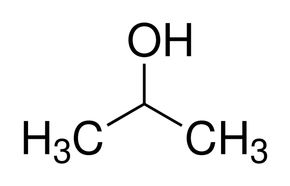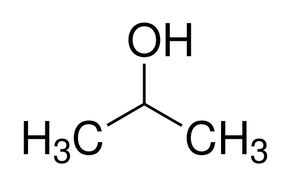2-Propanol
2-Propanol (17604)
VLSI Puranal
General Information
- CAS Number
- 67-63-0
- Grade
- VLSI
- Molar Mass
- 60.11 g/mol
- Synonyms
- Isopropanol
- Isopropyl alcohol
- Rubbing alcohol
Physical Properties
- Boiling Point/Range
- 77 to 83 °C (1,013 hPa)
- Color
- Colorless
- Density
- 0.784 to 0.786 g/cm3 (20 °C)
- Flashpoint
- 12 °C
- Melting Point/Range
- -90 °C
- Odor
- Alcohol-Like
- Partition Coefficient
- 0.05 (25 °C)
- pH
- Neutral
- Physical Form
- Liquid
- Solubility
- Soluble in most organic solvents
- Solubility in Water
- Completely miscible
- Vapor Pressure
- 42 hPa (20 °C) hectopascal
Safety Information
- Chemical Stability
- Stable under recommended storage conditions.
- Evaporation Rate
- No data available
- Ignition Temperature
- 425 °C
- Incompatible Materials
- Strong oxidizing agents
- Thermal Decomposition
- No decomposition if used as directed.
International Transportation
- Chemical Class
- 3
- Harmonized System Code
- 29051200
- Packing Group
- II
- UN Number
- 1219
General Information
- CAS Number
- 67-63-0
- Grade
- VLSI
- Molar Mass
- 60.11 g/mol
- Synonyms
- Isopropanol
- Isopropyl alcohol
- Rubbing alcohol
Physical Properties
- Boiling Point/Range
- 77 to 83 °C (1,013 hPa)
- Color
- Colorless
- Density
- 0.784 to 0.786 g/cm3 (20 °C)
- Flashpoint
- 12 °C
- Melting Point/Range
- -90 °C
- Odor
- Alcohol-Like
- Partition Coefficient
- 0.05 (25 °C)
- pH
- Neutral
- Physical Form
- Liquid
- Solubility
- Soluble in most organic solvents
- Solubility in Water
- Completely miscible
- Vapor Pressure
- 42 hPa (20 °C) hectopascal
Safety Information
- Chemical Stability
- Stable under recommended storage conditions.
- Evaporation Rate
- No data available
- Ignition Temperature
- 425 °C
- Incompatible Materials
- Strong oxidizing agents
- Thermal Decomposition
- No decomposition if used as directed.
International Transportation
- Chemical Class
- 3
- Harmonized System Code
- 29051200
- Packing Group
- II
- UN Number
- 1219
- CAS Number : 67-63-0
- Synonyms : Isopropanol|Isopropyl alcohol |Rubbing alcohol
- Grade : VLSI
- Molar Mass : 60.11 g/mol
- Density : 0.784 to 0.786 g/cm3 (20 °C)
- pH : Neutral
- Physical Form : Liquid
- Odor : Alcohol-Like
- Flashpoint : 12 °C
- Color : Colorless
- Melting Point/Range : -90 °C
- Boiling Point/Range : 77 to 83 °C (1,013 hPa)
- Partition Coefficient : 0.05 (25 °C)
- Vapor Pressure : 42 hPa (20 °C) hectopascal
- Solubility in Water : Completely miscible
- Solubility : Soluble in most organic solvents
- Chemical Stability : Stable under recommended storage conditions.
- Evaporation Rate : No data available
- Thermal Decomposition : No decomposition if used as directed.
- Incompatible Materials : Strong oxidizing agents
- Ignition Temperature : 425 °C
- UN Number : 1219
- Chemical Class : 3
- Packing Group : II
- Harmonized System Code : 29051200





